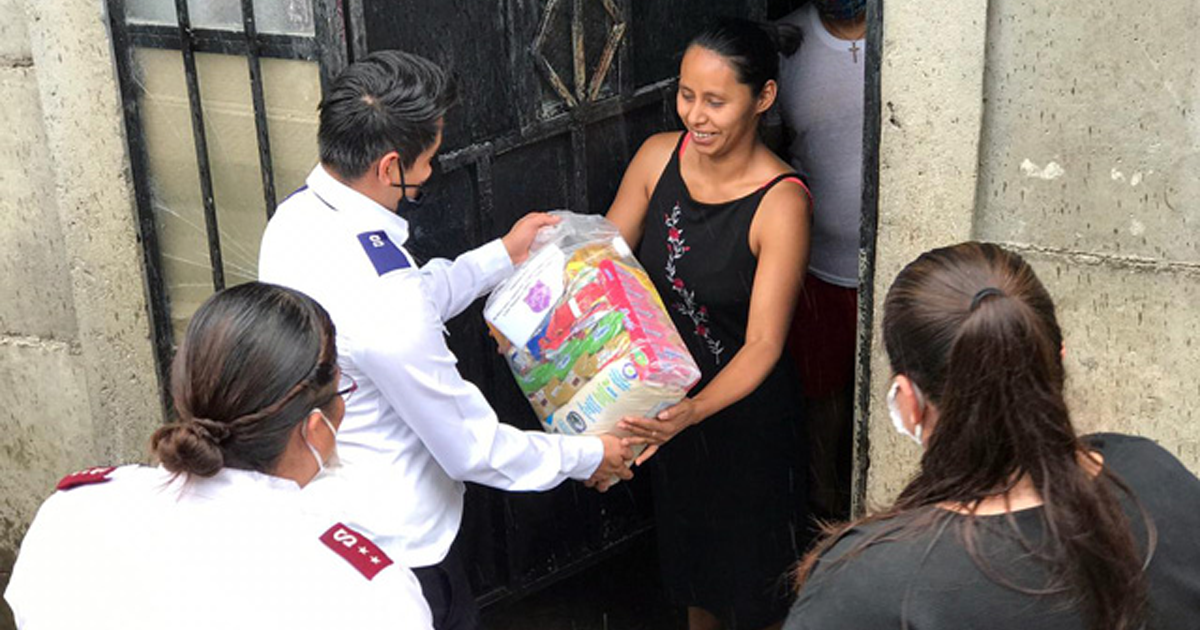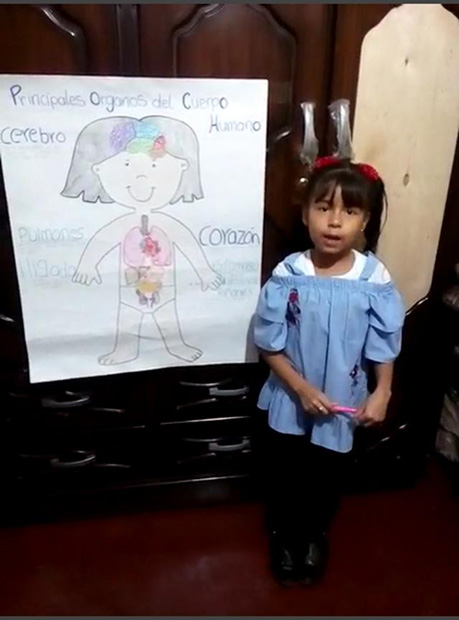My Coronavirus Story: Captain Astrid Carillo
Flexible, Adaptable, Sacrificial and Inspirational
As The Salvation Army’s school coordinator for Guatemala (and both school director and corps officer in Tierra Nueva), Captain Astrid Carillo finds herself on the frontline in the fight to care for children, some of whom live in very vulnerable situations. She told Jo Clark (Programme Resources, International Headquarters) how teachers in Salvation Army schools are finding ways to care for pupils, all of whom have to stay away from school during the COVID-19 crisis. She reveals that, despite the difficulties that need to be overcome, the situation is bringing together teachers, pupils, families and community members more closely than ever before:
I have been a Salvation Army officer (minister) for eight years. Before that, my professional background was in education administration and so, since becoming an officer, alongside each of my corps (church) appointments I have held responsibility within a school. At the moment, I am the coordinator of the five Salvation Army schools in Guatemala and the director of one. Across the five schools we have almost 600 pupils (aged from four to 12 years). Tierra Nueva School, which I oversee, has 87 pupils.
We have been in COVID-19 lockdown from 13 March until now. As you can imagine, this has posed immense challenges for us as a school community over the past 14 weeks.
Our school, in Guatemala City, lies in one of the most dangerous zones in the country. Even in normal times, economic poverty and drug addiction are rife. Life before COVID-19 was already tough, but we were able to see and meet the challenges of the life circumstances of our pupils by providing a stable school life and a good education. When coronavirus hit, we realised that we were going to have to develop a whole new strategy to support our children.
USING WHATSAPP
The majority of families do not have access to broadband Internet or computer technology, so providing online classes was not going to be an effective way forward for us. Many parents, though, do have a smart phone and data access to WhatsApp, so that is where we started.
Teachers have been developing work materials and sending them out as attachments to parents’ phones via WhatsApp. They have also sent out links to YouTube videos for those who have sufficient data and are able to watch with their children, and they have been arranging class group video calls where possible. For those families without smart phones, the team of teachers has been trying (where restrictions on movement allow) to visit in order to take worksheets to children’s homes and make sure to keep in touch with the families through regular support phone calls.
SUPPORT FOR FAMILIES
These support phone calls have been particularly important for families where a member has suffered from COVID-19, meaning they were required to completely isolate. To know they are being remembered has been crucial to families in such challenging times and has enabled us to build real confidence with them.
Where possible we have tried to support isolating and other particularly vulnerable families with some food and other necessities for their children. We have few resources for this but have witnessed corps and community members who do have more coming together to support those in most need.
The logistics of helping in this way have also proved particularly complicated. For the past three months it has been difficult to move around. Each Sunday the country president gives a televised COVID-19 briefing. Movement restrictions for the following week are announced at that briefing and depend on how the COVID infections are tracking at that time. Sometimes we are locked down completely and other times we are allowed out to buy essentials on one or two specific days of the week. Sometimes markets and supermarkets in our area will be allowed to open but other weeks they will be closed. Sanitary cordons are quickly set up to monitor temperatures and movements of people, disrupting plans for shopping or, at best, slowing them down.
This uncertainty of things, never knowing what the next week is going to bring, is one of the hardest things to deal with. It makes planning almost impossible and is leading to many stresses within families. For example, where families work to make money on a day-to-day basis it is not possible for them to buy supplies to last for a number of days, which is important in case the lockdown is re-tightened.
RURAL CHALLENGES

While our situation in the city has been difficult, at Chimaltenango – another of our schools, more than an hour’s drive from Guatemala City – the challenges are multiplied by its rural location. In this area, the community is much more vulnerable, and even in normal times life is more marginal. Many people speak only Kaqchiquel (not Spanish), electricity and other basic services are not available to the general population and access to smart phones and mobile data is not common. Despite this, our teachers are doing their utmost to keep the pupils connected and supplied with learning materials.
The flexibility and adaptability of our teachers in all our schools during these days really has been incredible. They have extended their contact hours, making themselves available whenever works best for parents and pupils, enabling parents to manage their children’s education alongside other stresses and priorities, such as sourcing food and household necessities, perhaps while supporting family and neighbours.
Some teachers have been using their own resources to top up data plans on their phones in times when we haven’t been able to support with this, in order that they can keep in contact with their students. They have also continued working even when our reserve funds were low (since parents have not been able to pay fees in these weeks) and we struggled to pay them on time. Thankfully, from last month we started to receive some financial support from the Salvation Army World Service Office (SAWSO), enabling us to have more confidence in the coming months.
Our teachers continue to make huge efforts to bring variety into the lockdown lives of their pupils in order to boost their emotional well-being. Each week they try to do something different to cheer and inspire the children and their family members. Last week, some teachers from Tierra Nueva School sent an exercise video and began a ‘day of challenges’ for the children to do with their family members. Yesterday they put on a puppet show for the children via WhatsApp!
Amazingly, despite the challenges we have faced we have managed to make and maintain contact with all our pupils from Tierra Nueva School. Making the first contacts wasn’t easy, and in some cases it was down to our stubborn determination (following up word-of-mouth leads and tracing down a number of other relatives in order to locate a particular family home) that we managed to find out how to contact the children. The efforts we made in locating people have enabled us to keep track of the most vulnerable children during the times we are allowed out.
GRATEFUL THANKS
During these months of lockdown, I personally have been eternally grateful for those from my school team and my corps family who have been so generous in their support. Being single, and living alone, has made this isolation particularly difficult at times. My father lives some distance away and I have not been able to visit him. Having the support of people from the corps who have called to check up on my health and welfare, and have supported with food when they can, has been a godsend, especially since corps monetary offerings (which support my allowance) have ceased.
I have come to appreciate the shared passion and dedication which my team of teaching staff has for the children in our care. The ways in which they have given of their own resources and have made themselves available for contact, any time of day and night, to support pupils and their families has really been extraordinary. This dedication and teamwork shown by the teaching staff in these unprecedented weeks has greatly deepened the relationships we, as a school, have with the pupils, their parents and families. As a result, we are finding that parents are becoming more interested and involved in supporting their children’s learning.
Approaching people with open hearts has enabled us all – teachers, pupils, parents, extended families and wider community members – to move forwards together.
We have no idea what the coming weeks will hold (in our area, cases of the virus have been increasing again recently) but we do know that with this closer union we have developed, God will continue to open doors and work out ways – even beyond our imagination – for us to meet our needs and for him to sustain us in the days ahead.







